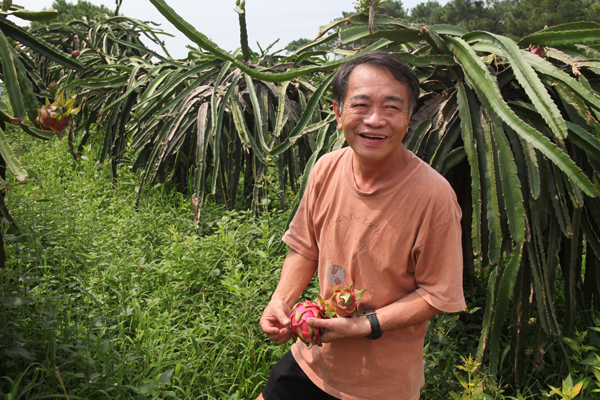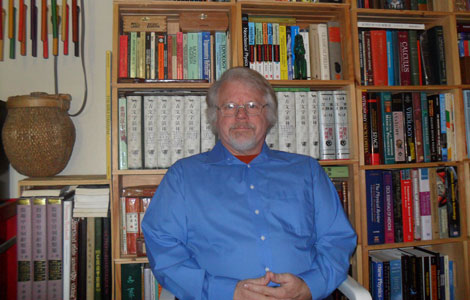Chasing the dragons
Updated: 2013-10-08 00:47
By Li Yang (China Daily)
|
||||||||
My China Dream | Liew Anh Luk
 |
|
Liew Anh Luk believes that industrialization should not be an excuse for developing countries to ignore agriculture. Photos by Huo Yan / China Daily |
He is a farmer who has tilled the soil in several countries from his native Malaysia to Indonesia, Papua New Guinea, and now, China. The humble man of the land talks to Li Yang in Qinzhou, Guangxi Zhuang autonomous region.
Liew Anh Luk says he sees more plants than people. After four decades working as a farmer all over Southeast Asia, Liew is continuing his pursuit of a personal vision — to plant pitaya in China.
Pitaya is a popular fruit that is more recognized by its other name, dragon fruit.
In China, there is a small geographical strip of land that is best suited for its cultivation and Liew came to China in 2002 to farm in Qinzhou, which is in that particular location, no more than 27,000 hectares, south of the Tropic of Cancer.
Qinzhou is the most suitable, with the right temperature and humidity, and protected from the area's frequent typhoons by the Shiwandashan Mountain ranges in the north and Beibu Gulf in the south.
"Liew is by no means an ordinary farmer and we learn a lot from him", says Zhu Yang, the special correspondent of Qinzhou city's agricultural bureau.
In response, Liew declares that he is not an expert on pitaya cultivation but that "people's knowledge on pitaya is limited".
The 63-year-old farmer is modestly garbed in worn sweaters and muddy sneakers as he paces through his farm, overgrown with wild grasses.
"This is a good way to protect the top soil. I do not want to return a patch of dead soil to the landowners 30 years later."
Liew's conscience is his guiding light.
Three years ago, he removed the organic label from all his fruits when a mill and brickyard were built next to his farm, even though his produce more than met Chinese standards.
"I simply cannot persuade my conscience not to do so."
In his opinion, only a very small part of his farm, right at the center, can still be called organic and free from contaminants.
Pitaya or dragon fruit cultivation is still considered a fledgling process and there is not much official emphasis on research and development.
"We spend a lot of time and money ourselves on research into the processes of pitaya," says Liew, who is already exploring making the fruit into vinegar, wine, juices and cosmetics.
There is already 50 million yuan ($8.18 million) invested in the business and Liew says his biggest achievement was "attracting more than 10 Chinese businessmen" to join the venture.
Lin Xingbiao, one of the largest investors in Liew's farm, says the farmer's perseverance and creativity touched him. Liao Jiyan, another investor, echoes that sentiment.
There were basic hurdles to overcome. After the rounds of land reform from the 1950s onwards, the question of who owns the land is a major problem and it took Liew a long time to sort out how to rent 270 hectares of land from about 500 families.

 Victoria Beckham S/S 2014 presented during NYFW
Victoria Beckham S/S 2014 presented during NYFW
 'Despicable' minions upset Depp's 'Lone Ranger' at box office
'Despicable' minions upset Depp's 'Lone Ranger' at box office
 'Taken 2' grabs movie box office crown
'Taken 2' grabs movie box office crown
 Rihanna's 'Diamonds' tops UK pop chart
Rihanna's 'Diamonds' tops UK pop chart
 Fans get look at vintage Rolling Stones
Fans get look at vintage Rolling Stones
 Celebrities attend Power of Women event
Celebrities attend Power of Women event
 Ang Lee breaks 'every rule' to make unlikely new Life of Pi film
Ang Lee breaks 'every rule' to make unlikely new Life of Pi film
 Rihanna almost thrown out of nightclub
Rihanna almost thrown out of nightclub
Most Viewed
Editor's Picks

|

|

|

|

|

|
Today's Top News
WB cuts growth forecast for China, East Asia
Kerry hails weapons destruction
Robust home sales during holiday
China calls on the United States to stay solvent
Beijing targets polluting cars
APEC 'should take lead' in FTA talks
US, Japan warned over sea issues
Academics evaluate China at conference
US Weekly

|

|







